THE GOVERNMENT INSPECTOR By NIKOLAI GOGOL ANALYSIS
TITLE: THE GOVERNMENT INSPECTOR By NIKOLAI GOGOL
SETTIG: RUSSIA
YEAR: 1834
1. Anton Antonovitch- The town mayor
2. Anna Andreyevna – His wife
3. Marya Antonovna – His daughter
4. Luka Lukitch – School Superintendent
5. Ammos Fyodorovitch – District Judge
6. Artemy Filipovitch – Charity Commissioner
7. Ivan Koosmitch – Postmaster
8. Dobchinsky – Town landowner
9. Bobchinsky – Town Landowner
10. Hlestakov – A junior official from Petersburg
11. Yosif – His servant
12. Mishka – Mayor’s servant
13. Abdulin – A town merchant
PLOT SUMMARY
Act I
The play is set in a small town in provincial Russia, in the 1830s. Act 1 takes place in a room in the mayor’s house. The mayor has called together the town’s leading officials—including the judge, the superintendent of schools, the director of charities, the town doctor, and a local police officer—to inform them that a government inspector is due to arrive from Saint Petersburg. The mayor explains that this government inspector is to arrive “incognito” with “secret instructions” to assess the local government and administration of the town. The mayor, in a panic, instructs his officials to quickly cover up the many unethical practices and general corruption of the local town authorities. The brothers Bobchinsky and Dobchinsky, two local landowners, rush in to inform the mayor and his officials that they have seen the government inspector staying at the local inn. Mayor plans to visit the Inn Hotel to meet and greet the “Very Important Person” at the inn, his wife and his daughter, Marya, enter, asking about the inspector.
Act II Scene 1
Act 2 takes place in Hlestakov’s room at the inn Hotel. He is a young man of about twenty-three
years. He is a government clerk of the lowest rank from Petersburg, who has lost all of his money gambling, and is unable to pay his bill for two weeks’ food and lodging at the inn. The hotel attendants are angry of this and they threaten to report the case to the town mayor while Hlestakov insists that he will pay the bill. Meanwhile Mayor enters the in Hotel, assuming that Hlestakov is indeed the government inspector. He offers to show Hlestakov the local institutions, such as the prison, whereupon Hlestakov thinks he is being arrested for not paying his bill. The confusion continues, however, until the mayor bribes Hlestakov 400 roubles and then invites Hlestakov to stay at his home, and the young man goes along with this apparent generosity without understanding that he is being mistaken for someone else.
Scene 2
Scene 2 takes place in the mayor’s house. The mayor’s wife and daughter are eagerly awaiting the arrival of the government inspector. Hlestakov and the mayor enter, the mayor having given him a tour of the hospital and a hearty meal. Finally catching on that he is being mistaken for a high- ranking government official, Hlestakov launches into an elaborate fantasy of his luxurious and
privileged life in Saint Petersburg. When Hlestakov retires to his room in the mayor’s house, the mayor’s wife and daughter bicker over which of them he was flirting with.
ACT III
Scene 1
This scene also takes place in the mayor’s house. The next morning being scared of Hlestakov’s reaction, mayor sends in each of his town officials to give Hlestakov as much money as he asks of them. The mayor hopes this bribe money will keep Hlestakov from reporting them to the officials in Saint Petersburg. Hlestakov makes the most of this opportunity, asking each man for increasingly extravagant amounts of money. When they have all left, Hlestakov writes a letter to his friend, Tryapichkin, in Saint Petersburg, describing the situation for the sake of amusement. A group of local shopkeepers arrive to speak to Hlestakov regarding the extensive corruption and bribery that takes place on the part of the mayor. When they have left, Hlestakov proceeds to flirt with Marya, the mayor’s daughter; however, the minute she leaves the room, he flirts with the mayor’s wife. But, when Marya walks in to find Hlestakov pleading his love to the mayor’s wife, he immediately proposes marriage to her (Marya). When the mayor enters, he does not initially believe Hlestakov has proposed marriage to his daughter, but he is soon convinced. At this point, Yosif enters, having made plans for Hlestakov to leave the town as quickly as possible, before his deception is discovered. Hlestakov tells the mayor and his wife and daughter that he is leaving town for only a few days, but he will return soon to marry Marya.
Scene 2
Scene 2 continues in the mayor’s house. The mayor and his wife boast of the luxurious and privileged life they will lead in Saint Petersburg once their daughter has married this high-ranking official. Other town officials and their wives pay a visit at mayor’s house to congratulate him and say a farewell since soon after his daughter’s marriage he will be leaving for Saint Petersburg to live there. The postmaster arrives, having intercepted and read Hlestakov’s letter to his friend in Saint Petersburg, revealing that he has deceived the entire town, and cheated them out of large sums of money. Calling himself an “idiot,” the mayor wonders that he could have been so foolish as to mistake the young man for “an illustrious personage.” At this point, the mayor turns to the theater audience and utters the famous line, “What are you laughing at? You are laughing at yourselves.” Just then, a gendarme (a soldier who serves as an armed police force) enters with the announcement that the real “inspector authorized by the Imperial government” has arrived, and awaits the mayor and his team at the inn. The play ends with each of character remaining frozen in a posture of surprise and fear upon the announcement that the real government inspector has arrived.
ANALYSIS.
A. FORM.
(a) Genre: A comedy play
(b) Title: The Government Inspector.
(c) Title VS Content
Title of the play The Government Inspector has a strong relationship with its content in a number of ways as follows;
(i) Mayor receives the news of the secret coming of the Government Inspector from Petersburg with secret orders to inspect their town. He therefore calls his fellow officials like the school superintendent, the Judge and the Charity commissioner at an emergency meeting in his house in order to discuss about this arrival and see the way they will cover up some of their failings.
(ii) Bobchinsky and Dobchinsky (two land owners in the town) suspects that Hlestakov ( a junior official from Petersburg) who is staying at the Inn Hotel for about two weeks now might be the
Government Inspector and therefore they report him to the mayor and his fellow officials and this leads them to treat him as the real intended Government Inspector by taking him to inspect their town and even bribing him so as to silence him in case he discovers some of their failings.
(iii) When Hlestakov leaves, it is then discovered that he wasn’t the intended Government Inspector. All officials get stunned and meanwhile they are informed that the real intended Government inspector appointed by the imperial decree from Petersburg has arrived and needs their presence for an inspection.
(c) SETTING.
Setting of this play is in town in Russia in the 1830s, also there are some some sub-settings which includes.
Mayor’s house where he meets his fellow officials and later on other events take place after
Hlestakov arrives.
The Inn Hotel where Hlestakov stays for two weeks and then meets the mayor.
(d) PLOT.
The events are sequentially arranged in a straightforward way with three acts. Act one has only one scene, act two is composed of two scenes and act three also is composed of two scenes.
LITERARY DEVICES.
(i) Similes.
I’m still sweating like a bull(p.46)
It would be as suitable as a saddle on a cow(p.72)
A mayor; He’s a generous chap,his hospitality is like a pole-axe, but he’s as stupid as an old grey
mule(p.75)
The Charity Commissioner….looks like a sow in a nightcap(p.76)
They came running here from the Inn, babbling like lunatics(p.79)
(ii) Metaphors.
They are old pumpkins (p.19)
Goodbye Angel of my heart (p.64)
Ungrateful dogs (p.80)
(iii) Hyperbole/Exaggeration/Overstatement
My heart’s in my mouth
Tryapitchkin will die with laughter(p.70)
There never was a mayor like him,never We can’t find words for the things he does(p.71)
The tears just come in floods(p.84)
Fire ran in my veins, my body felt on fire (p.87)
For a whole hour I couldn’t read a line(p.88)
This is killing (p.90)
(iv) Personification.
Heaven knows what he puts into it(p.42)
Now my damned tongue’s given me away(p.65)
(v) Litotes.
That is not impossible (p.49) It means that is possible.
(vi) Sayings.
Trust a pig to smell out the rich feeding (p.85)
(e) STYLE.
Several styles have been employed by the playwright including the following.
• Dialogue: Most of the play is written in dialogue form something which is common in plays.
• Aside: This style/technique is frequently used where by characters speaks to the audience a speech which is unheard by other characters on stage. This technique is mostly employed by the playwright.
• Point of view. The point of view used in this play is the first person point of view where the
pronouns “I” and we have been full employed as is common to plays.

(f) CHARACTERISATION.
1. HLESTAKOV.
He is a junior civil servant from Petersburg. He is a clerk of lowest rank in Petersburg.
He is a young man of about 23 years.
He is extravagant as he uses all his money in gambling and playing card games to the point of selling his own clothes to meet his financial demands.
He is dishonest as he uses the opportunity of ignorance of the town officials to exploit them via bribery in the name of loans.
He is corrupt, exploiter and tricky. He receives bribery from all town officials and exploits them.
He is a hypocrite as he firstly pretends to love Anna and then abruptly changes his mind and
claims to love Mary, Anna’s daughter.
He is a drunkard as he drinks in mayor’s household to the extent of losing his senses.
He is abusive as he uses abusive words to the waiter and his servant.
He finally leaves the town by deceiving the mayor’s family to turn back few days later for his marriage to Marya, the mayor’s daughter.
His lies are discovered through his later he sent to his friend via the post office after it has been read by the postmaster
2. THE TOWN MAYOR.
He is in charge of the town, he has the most power than any other official in the Town.
He is the most corrupt person in the town as he takes and gives out bribery. He takes bribery from the town merchants and gives 400 roubles to Hlestakov and some roubles to Yosif as a bribery
He is an irresponsible leader as he uses his power for private gains and provides fake tenders to the town merchants.
He is abusive and cruel as he uses abusive words to the merchants who brought charges against him to Hlestakov.
He is hot-tempered because he gets angry easily and reacts angrily as he does to the merchants.
3. DISTRCT JUDGE.
He is in charge of the town court.
He is also irresponsible as his working premises are dirty since his porter stores geese in the court and makes it smelly geese.
He is corrupt as he receives and takes bribery. He declares it as he says “I freely admit that I take bribes”(p.4), He also gives 400 roubles to Hlestakov as a bribe.
He is a womanizer because he sleeps with Dobchinsky’s wife and fathers children with her.
He twists justice of the cases because of the bribes he receices.
4. CHARITY COMMISSIONER.
He is in charge of the Hospitals.
He is an irresponsible charity commissioner because he never cares with the wellbeing of the patients whether they recover or die, he doesn’t care, he doesn’t bother to buy expensive medicines.
He is also corrupt since he gives Hlestakov 400 roubles to cover up his failings in the hospitals.
He is a hypocrite as he accuses his fellow officials to Hlestakov. He is the one who reports to Hlestakov that the school superintendent corrupts the minds of the students and that the district judge sleeps with Dobchinsk’s wife and fathering children with her.
5. LUKA LUKITCH.
He is a school superintendent, in charge of supervising the schools and teachers.
He is also corrupt as he gives Hlestakov 400 roubles and tells him Don’t dream of returning it……”
He is also hypocrite as he does some some fake preparations to hide the weaknesses of his duties.
6. IVAN KOOSMITCH.
He is post master in charge of the post office.
He is an irresponsible person as he delays the mails.
He is a dishonest person as he opens and reads the letters that come via his office and keeps those that he finds the most interesting.
He opens and reads Hlestakov’s letter to his friend where he gets the true identity of Hlestakov.
He is also corrupt as he is the one who suggests that they should give the government inspector bribery and tell him that it came via mail and the owner is not known
7. YOSIF.
He is Hlestakov’s servant.
He is the first to discover the issue of a mistaken identity before his master.
He is also corrupt as he takes some roubles from the mayor as a bribery after giving the information of the things his master wants.
He is confident as he dares to refuse his master’s orders of bringing his breakfast from the
waiter.
He is deceitful as he also hides to the town officials the ture identity of Hlestakov.
8. ANNA ANDREYEVINA.
She is the mayor’s wife.
She claims to have ever read some of Hlestakov’s novels.
She is an easy-going as she almost falls in love with Hlestakov could not it have been the presence of her daughter and the sudden appearance of her husband.
9. MARYA ANTONOVNA.
She is the mayor’s daughter
She somehow challenges Hlestakov in his lies but is stopped by her mother.
She easily agrees to Hlestakov’s marriage proposal without knowing the man in details, this implies that she is also ignorant since she was supposed to take time to know Hlestakov in details before accepting his marriage proposals.
B. CONTENT
Content covers the following areas of discussion;
(i) Themes
(ii) Conflicts
(iii) Roles and Position of women
(iv) Lessons/messages.
(v) Relevance.
(I) THEMES
The play The Government Inspector reveals the following themes.
1. CORRUPTION/BRIBERY.
The whole play seems to be centered on the them of corruption. This society is occupied with corruption in their daily lives. All the officials are corrupt and via them, corruption is portrayed through the following scenarios.
The district judge admits that he receives bribery to twist the cases against justice. He also gives Hlestakov 400 roubles as means of silencing him.
The town mayor is also corrupt. He gives Hlestakov 400 roubles at the Inn as a bribery and promises to clear off his bill debts at the Hotel. He also gives Yosif some roubles as a bribery. He is also accused of taking bribes from the town merchants so as to work in their favour.
Luka Lukitch, the school superintendent is also seen giving Hlestakov 400 roubles as a bribery.
The Charity Commissioner bribes Hlestakov 400 roubles.
The postmaster suggests that they should give the government inspector bribery and tell him that it came via mail and the owner is not known.
Bobchinsky and Dobchinsky altogether give Hlestakov the total of 65 roubles as a bribery.
The towm mercahnts are also corrupt as they want to give Hlestakov sugar and wine calling them our simple offerings. Hlestakov turns down their offerings and demands a loan of 300 roubles but they give 500 roubles instead as their bribery to him believing that he will help them in their demands.
Hlestakov and his servant Yosif are corrupt as they receive bribery as much as possible from the town officials.
2. IRRESPONSIBILITY.
The town officials are all irresponsible people in fulfilling their duties and responsibilities. That’s why all of them agree to bribe the coming Government Inspector in order to cover up their failings in their duties. However other cases of irresponsibility appeared in the following scenarios.
The town mayor is irresponsible as he allows the second merchant to supply the rotten clothes. He also showed Abdulin how to make a fortune by supplying the timbers at a cost of 2,000 roubles while they didn’t cost even a 100 roubles.
The district judge is irresponsible because he uses the courthouse for his personal activities by keeping the geese something that causes the courthouse to have a bad smell.
The charity commissioner is irresponsible because he doesn’t buy medicines for the patients and he doesn’t care anything even if they die.
3. SELF DECEPTION.
The town officials led by Bobchinsky and Dobchinsky deceive themselves by believing that Hlestakov was the real Government Inspector they have been waiting for while he was not. It is this self deception that gives Hlestakov chance to use the opportunity to deceive, corrupt and exploit them by making money through bribes he takes from them. Their self-deception seems to have been cause by their ignorance because there is no any reason that made them to believe that.
4. IGNORANCE.
All the town dwellers, both the officials and common people are ignorant. It this ignorance that Hlestakov takes advantage of and exploits their money and then runs away insulting them in his letter that they are stupid. They are asked for the loans by person they don’t know in details and they then give it out unquestionably some of them daring to tell him not to turn it back. This proves their ignorance.
5. BAD LEADERSHIP.
All the town officials reveal the theme of bad leadership as they altogether admit that they have some failings in their areas of supervision. They all rely on corruption and bribery as their means of solving their responsibilities/ shortcomings. Bad leadership leads to corruption and other injustices in the society.
6. NEPOTISM.
The town people requests mayor’s favour in case his plan to live in Petersburg and being appointed the General succeeds. They visit mayor to congratulate him but in addition to that, they beg mayor’s favour to them in different occupatios where possible. This indicates that this society is preoccupied by the favourtism mindset.
7. BETRAYAL.
The town judge betrays Dobchinsky by having a love relationship with Dob’s wife and bares children with her. It is said that all Dobchinsky’s children look like the Judge something which signifies the presence of this betrayal. Dobchinsky’s wife also betrays her husband by sleeping with tha Judge out of wedlock.
8. DRUNKARDNESS.
Hlestakov seems to be a drunkard person. He drinks heavily at the mayor’s household to the point of losing his senses. He finally goes to sleep while he is at the situation of not knowing what he is talking about. The town dwellers also portray this picture of drunkardness. Too much drinking implies irresponsibility as drinking and responsibility cannot be cooked at the same pot.
9. EXTRAVAGANCE.
Mr. Hlestakov is extravagant as he misuses the money by playing card games and living luxurious life beyond his ability. He does so to reach at the point of selling his own clothes so as to cover up his expenses.
II. CONFLICTS.
The play The Government Inspector has a number of conflicts including the following.
1. Conflict between Hlestakov and Yosif.
This conflict happens when Hlestakov sends Yosif for his breakfast to the waiter but he refuses claiming that the waiter and his boss are reluctant to save him a breakfast anymore until he clears off his previous bill. Hlestakov gets angry and uses abusive words against Yosif.
2. Conflict between Hlestakov and the waiter.
This conflict is caused by the same reason as above because Hlestakov demands his breakfast but the waiter refuses to save him any more meal till he pays his previous meal depts. It takes the two into a quarrel and Hlestakov insults the waiter while the waiter threatens to report the case to the town mayor. However, finally the waiter saves him a low quality breakfast.
3. Conflict between mayor the the town merchants.
It occurs after the town merchants accuse mayor to Hlestakov due to his habit of taking bribery to them forcefully and oppressing them. The mayor reminds them of his favour to them and threatens to cut off his favour and take disciplinary actions against them. They come down and apologize and that ends up the conflict.
4. Town officials against Bobchinsky and Dobchinsky.
After the discovery of the true identity of Hlestakov, all the town officials turn their angers to Bobchinsky and Dobchinsky since they are the ones who claimed that Hlestakov is the real Government they have been expecting to comE from Petersburg.
SOURCES OF CONFLICTS.
1. DISOBEDIENCE.
The conflict between Hlestakov and his servant, Yosif, has been caused by Yosif’s disobedience behavior of not adhering to his master’s orders. He was supposed to do what he was ordered by his master and not to argue against him.
2. POVERTY.
The conflict that happened between Hlestakov and the waiter was caused by Hlestakov’s poverty. Could he have been rich he would have paid for his bills and no any conflict would have been occurred.
3. CORRUPTION.
The conflict between the mayor and the town merchants was caused by the mayor’s behavior of taking bribery from the merchants forcefully. That is the reason as to why the merchants accused him to Hlestakov a situation that causes the conflict between them.
4. IGNORANCE.
Ignorance is the source of the conflict between the town officials against Bobchinsky and Dobchinsky. It is their ignorance that takes them to inform the officials that Hlestakov is the Government Inspector as there is no apparent reason that made them to judge him as the they judged.
III. ROLES AND POSITION OF WOMEN.
The playwright has portrayed women with the following status in this society.
(i) Women are portrayed as the ones responsible for domestic activities.
This responsibility is portrayed through Anna and Marya since after Hlestakov has agreed to shift from the Inn hotel to mayor’s house, the mayor sends Dobchinsky to tell the two women Anna and Marya to prepare meals and accommodation for their guest. This shows that women are responsible for the domestic activities.
(ii) Women are portrayed as easy-going.
This is portrayed through Anna as she almost falls in love with Hlestakov could it have not been the
presence of her daughter and the sudden appearance of her husband in Hlestakov’s room.
(iii) Women are portrayed as betrayers.
This position is revealed through Dobchinsky’s wife the way she batrays her husband by sleeping with the district judge and having children with him. This implies that women are betrayers.
(iv) Women are easy people to be deceived.
Both Anna and her daughter Marya are easily deceived by Hlestakov that he loves both of them and they don’t question it. Also when he proposes to marry Marya, both of them accept easily while Hlestakov was deceiving them. It shows that women are easy people to be deceived by men.
IV. MESSAGES OR LESSONS.
Corruption and bribery are the sources of irresponsibility and underdevelopment and it should be fought with all means being.
The leaders should be responsible in fulfilling their duties and responsibilities. They should not wait till the time of inspection to use bribery to cover up their failings.
Leaders should not use their power for private interests. They should use their position to solve the problems of their citizens.
Betrayal in marriage is not good as it can cause unnecessary quarrels and separation of families.
Ignorance is an obstacle to development. We should fight against ignorance.
V. RELEVANCE.
Despite being written in the 19th century, the play is still relevance to our contemporary society in a number of ways as follows;
We still have bad leadership, corruption, ignorance of the leaders and the common people.
We still have irresponsibility among the government leaders who become active only when there is a superior visiting their institutions.
Betrayal, drunkenness, hypocrisy and the like are all common in our societies. (Mwita)
CLICK HERE TO DOWNLOAD PDF






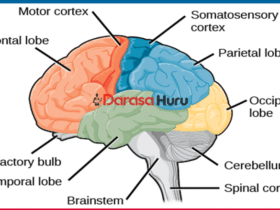










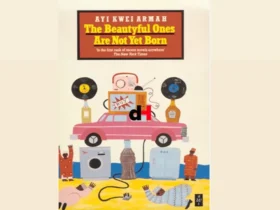
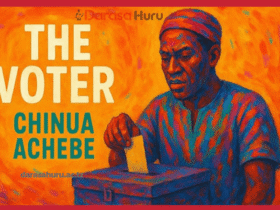




















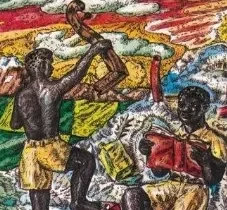

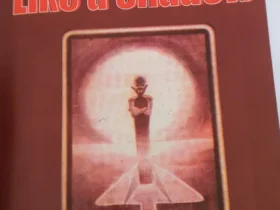
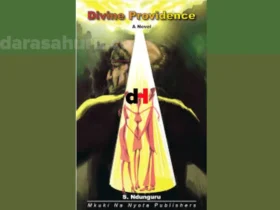
Leave a Reply